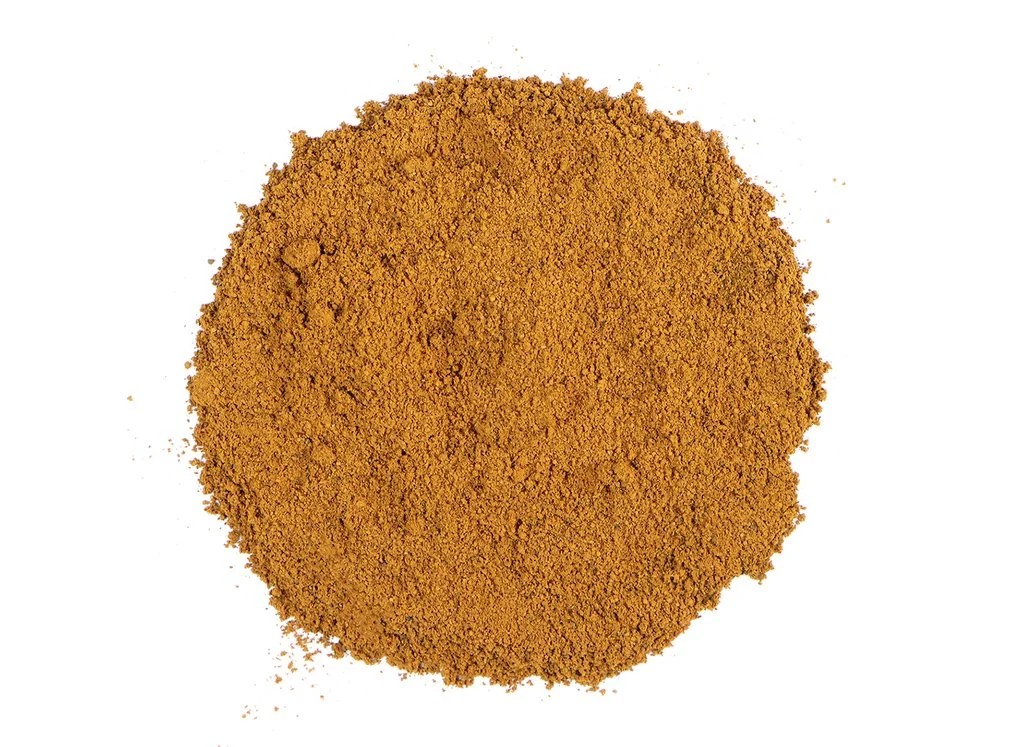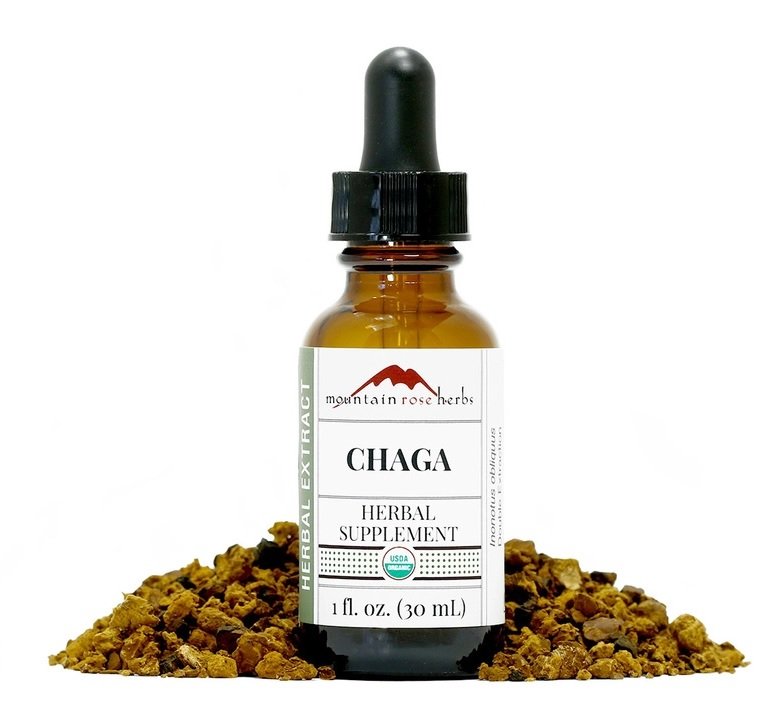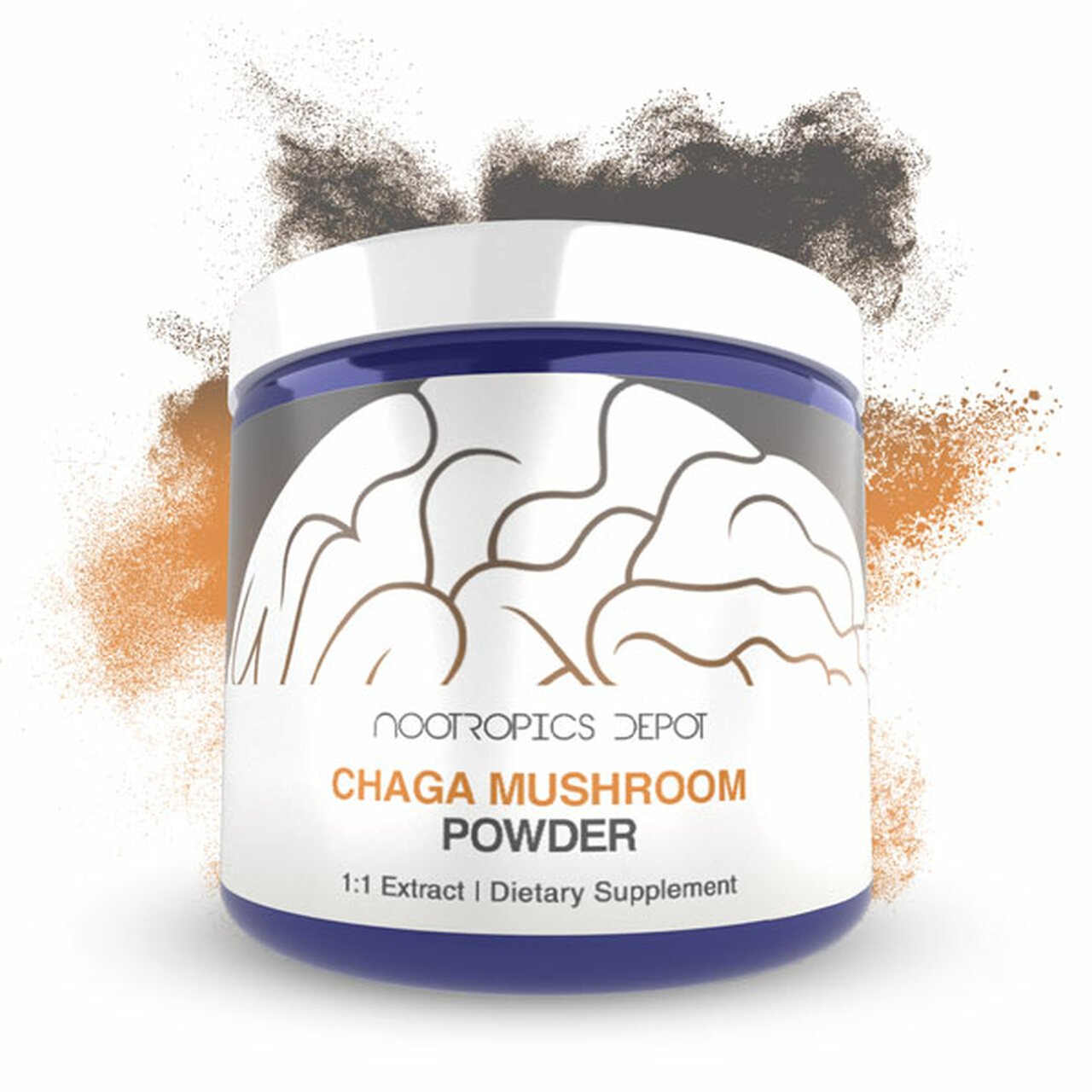Chaga Mushroom
Article by Stefan Burns - Updated April 2022. Join the Wild Free Organic email newsletter!
Piece of chaga mushroom. CC4.0 Christine Young
| Name: | Chaga Mushroom, Linnaean - Inonotus obliquus |
| Color: | The mycellium mass which is harvested is black on the outside, yellowish orange to brown on the inside |
| Constituents: | Polysaccharides, glycoproteins, ergosterols, triterpenoids, mycoflavonoids, melanin, oxalate, other myconutrients |
| Effect: | Antioxidant, anti-inflammatory, anti-cancer, improves autonomic nervous system function, improves digestion, endocrine adaptogen, exhibits DNA protection properties |
| Preparation: | The chaga mass is ground into a powder. Often extracted and standardized to increase beta-glucan content by weight |
| Dosing: | 250-1000mg extracted powder, 1-3g raw powder |
| General Notes: | Chaga is harvested off birth and some other trees. What is harvested is not the fruiting body but instead a mass of sterile mycelium. Can be used as a coffee substitute, thicker cut whole powder works well mixed into coffee grounds before coffee extraction. Often used daily as a general longevity and immune booster with beneficial effects on the cardiovascular system. Its high concentration of melanin make it a potent antioxidant. Has a special place of honor in traditional Chinese medicine. |
What is Chaga Mushroom?
Chaga is a type of mushroom which grows mainly on birch and much less frequently alder, witchen, and bird cherry. In the process of colonizing a tree, it forms a sterile mostly black mass made of mycelium on the outside of the tree which resembles charcoal because it contains a large amount of melanin. This mass is known as a sclerotium. The harvested sclerotium is the chaga mushroom that is used medicinally and supplemented with. Chaga mushroom contains high levels of beta-glucans and triterpenoids which have powerful health effects. In Eastern Europe medicinal preparations have been made using chaga mushroom for thousands of years. Hunters in those regions would often brew a strong tea from ground chaga which helped them sustain high energy output while traversing the wilderness. The chemical composition of chaga differs significantly from other polypore mushrooms such as reishi mushroom which makes it unique. Chaga is nontoxic, well tolerated, and has virtually no counterindications for medicinal usage.
Chaga Mushroom Identification
Chaga mushroom identification is not always easy, there are various tree rots, growths, and diseases that can look like chaga mushroom. Identification for chaga starts by positively identifying the tree species a potential conk is growing on, and then by examining the conk for chaga-specific identifying characteristics. Some tree burls can look like a chaga conk in shape and size, but aren’t blacked like chaga is, or if they aren’t they don’t possess the rich interior amber, orange, and brown colors. Chaga that is harvestable doesn’t provide a spore print because it is mycelium and not the fruiting body of chaga fungus. Chaga mushroom has no gills and is best harvested in the late summer, fall, and early winter.
Chaga from dead or fallen trees is known as “dead chaga” and will appear black inside and outside and should never be harvested as will likely contain mycotoxins. Chaga collected in ecologically unsafe areas polluted from human activity are unsafe for consumption and can contain significant levels of heavy metals such as lead, arsenic, and strontium.
Chaga Mushroom Benefits
Chaga mushroom has a wide range of positive health effects because of its unique combination of micronutrients, minerals, and myconutrients. Chaga mushroom contains high concentrations of potassium (9-10%), magnesium (0.65%), calcium (0.4%), and phosphorus (0.25%), with more minor minerals being iron, copper, zinc, and chromium. Fifteen amino acids have been identified in chaga mushroom, with glycine, aspartic acid, and glutamic acids making up about 40% of total amino acids. Chaga contains flavonoids (notably anthocyanins and quercetin), triterpenes, beta-glucans, and a high amount of antioxidant melanin pigments which protect against carcinogenic and mutagenic factors as they are involved in DNA repair and cell metabolism.
Together these chemical constituents and many others broadly influence the function of digestive, immune, cardiovascular, metabolic, and regenerative systems providing the following benefits:
Chaga Mushroom Improves Digestion
Chaga is helpful in treating gastric disorders such as stomach ulcers and intestinal pain
Chaga possesses strong antimicrobial activity and is useful in improving the microbiome
Chaga Mushroom Improves the Immune System
Increases T-Helper lymphocyte concentrations
Normalizes cytotoxic activity of natural killer cells
Blocks the receptors of tumor cells suppressing their migration
Chaga Mushroom Optimizes the Cardiac, Nervous, and Metabolic Systems
Chaga calms erratic heart rhythm variability while increasing contractile power of the heart
Modulates cell metabolism at the central and peripheral nervous system level
Increases the excitable properties of cell membranes
Chaga Mushroom helps with Healing and Repair
Many chaga constituents especially melanin are powerful antioxidants which possess anti-inflammatory and radioprotective effects.
Chaga is helpful for skin conditions such as periodontitis, eczema, dermatitis, and psoriasis
Chaga lowers risk of cancer
Chaga has a pain-relieving action
Improves wound healing and DNA repair
Note: Much of the research into chaga showing these benefits has been done using animal models and therefore hasn’t been confirmed for humans.
Chaga Mushroom Side Effects
As stated earlier, chaga is nontoxic, well tolerated, and has virtually no counterindications for medicinal usage. With that said it has been shown that the effects of chaga are dose-dependent, with small doses often being most effective while larger doses may lead to an opposite action. This U-shape relationship for chaga is most commonly observed for the functions of the cardiac and nervous systems.
Though chaga has been shown to be helpful in improving the function of the heart, sympathetic, and parasympathetic nervous systems, if these systems are dysfunctional then chaga supplementation should be done carefully with only very small dosages to start off in order to determine medicinal usage is positive or negative or negative in effect. It is highly unlikely for the usage of chaga to be deleterious but it is best to proceed with the supplementation of any new herbal with an abundance of caution and start on the low end of the recommended dosing range.
Chaga Mushroom Dosing
Chaga mushroom is dosed differently based on the intended purpose and the degree or refinement. A preventative health dosing regime of chaga mushroom will be less than the recommended dosage for someone fighting cancer who wants to improve their chances of entering into remission.
Raw chaga that hasn’t been made more potent through extraction processes can be dosed in the 0.5-3 gram range. The higher end of that range is best served when extracting chaga myconutrients using water such as when brewing chaga into a tea or with coffee.
Chaga that has been extracted and standardized is more potent and therefore is dosed lower accordingly. It is not possible for provide a dosing range for extracted chaga supplements because it depends on the level of extraction, but for example if it’s a 4:1 extraction (4x more potent), then dose the 4:1 extract at 1/4th the recommended raw dosage.
Making Chaga Tea or Chaga Coffee
Up to 40% of chaga mushroom by dry-weight are water-extractable substances which makes it a good medicinal mushroom for brewing into tea or into coffee.
To brew a chaga tea steep 2-3 grams of ground chaga mushroom in 170 F (75 C) hot water for 8-15 minutes. Best down with a removable tea ball or some other steeping implement.
To brew a chaga infused coffee, mix 2-3 grams of chaga powder into the coffee grounds and brew as normal, whether this is done via drip, French press, or other.
Where to Buy Chaga Mushroom Supplements?
My favorites suppliers of chaga medicinal mushroom are Mountain Rose Herbs and Nootropics Depot. There are many other high-quality suppliers of chaga mushroom out there, but for the level of quality and price Mountain Rose herbs and Nootropics Depot are the best, and the differences between their chaga products provides different options for use.
Mountain Rose Herbs Organic Chaga
Mountain Rose Herbs is a supplier of organic herbs, spices, oils, and other health care products. Mountain Rose Herbs is organic and sourced from hardwood forest in the northern hemisphere. They sell chaga mushroom in course and fine powders as well as in an extract.
Chaga Mushroom Powder
The Mountain Rose Herbs chaga powder is milled from the entire sclerotia. As a whole milled powder it contains the full spectrum of beneficial health compounds found in chaga such as beta-glucans and triterpenes.
Compared to the Nootropics Depot chaga it’s quite a bit more coarse and it floats, so adding it directly to a drink makes for a chunky experience which may or may not bother you. It’s coarse nature makes it great for directly brewing into a drink akin to coffee, or for mixing into coffee grounds to make a chaga coffee. Chaga is an ingredient in my “best nootropic coffee”.
Standard dose is 0.5 - 3 grams once daily.
Chaga Mushroom Extract
Mountain Rose Herb’s chaga mushroom extract is dual water and alcohol extracted and the final product has an alcohol percentage of 20-30%. It comes in 1, 2, 4, 8, 16, and 32 oz sizes.
Chaga tincture is great for direct supplementation under the tongue or with a dropper full into a favorite drink like juice, coffee, smoothie, or something stiffer.
Nootropics Depot Chaga Supplements
Nootropics Depot is a supplier of common and uncommon herbal supplements and other compounds like nootropics. They have a high standard of quality that they adhere to and maintain very transparent business practices which many supplement companies fail to do (or choose not to).
Chaga 1:1 Mushroom Extract Powder
The chaga mushroom powder sold by Nootropics Depot is very finely milled which makes it excellent for stirring directly into a drink like coffee without creating any unpleasant clumps or graininess.
Standard dose is 500 mg once daily.
Beta-Glugan (β-Glucan) minimum content: 8%
Contains Triterpenoids
References:
Shashkina MYa, Shashkin PN, Sergeev AV. Chemical and medicobiological properties of chaga (Review). Pharm Chem J. 2006;40(10):560-568.
Disclosure: Wild Free Organic is a member of various affiliate programs and if a purchase is made through one of our affiliate links a small commission is received. This does not affect your purchase price. Visit our disclosure page for more information.








Chaga is a medicinal mushroom that has a strong safety profile which has been used for thousands of years as a health preventative and to treat a variety of health problems that affect the digestive, immune, and cardiac systems. Chaga mushroom is unique among polypore mushrooms since 40% of its dry-weight are water soluble compounds, making it ideal for easily brewing as a tea or into coffee.